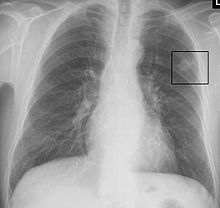Chest x-ray showing lung cancer in the left lung.
John M Mandrola, M.D., writing in Medscape, discusses the painful truth that cancer screenings don’t reduce mortality.
“Recent reviews of the evidence show that current-day screening techniques do not save lives. Worse, in many cases, these good-intentioned searches bring harm to previously healthy people.”
“I know what you may be thinking. We have all heard the anecdotes — cases that are often celebrated in local news reports and hospital marketing material. People saved by early detection, and the opposite: the unscreened felled by late-stage disease.
“Anecdotes, however compelling, are not evidence. When you pull up a chair, open your computer, take a breath, suspend past beliefs, and look for the evidence that screening saves lives, it simply isn’t there.”
“….Doctors Vinay Prasad (Oregon Health Sciences University, Portland) and David Newman (School of Medicine at Mount Sinai, New York), along with journalist Jeanne Lenzer, find that disease-specific mortality is a lousy surrogate for overall mortality. They report that when a screening technique does lower disease-specific death rates, which is both uncommon and of modest degree, there are no differences in overall mortality.
“The authors {paraphrased here by Dr. Mandrola} cite three reasons why cancer screening might not reduce overall mortality:”
- “Screening trials were underpowered to detect differences. {B}ut doesn’t the fact that a trial requires millions of subjects to show a difference, mean there is little, if any, difference?
- “Downstream effects of screening may negate any disease-specific gains.” “My translation: harm. Dr. Peter Gøtzsche … wrote in a commentary that ‘screening always causes harm. Sometimes it also leads to benefits, and sometimes these benefits outweigh the harms.’ To understand harm resulting from screening, one need only to consider that a prostate biopsy entails sticking a needle through the rectum, or that some drugs used to treat breast cancer damage the heart.
- “Screening might not reduce overall mortality because of ‘off-target deaths.’ An illustration of this point is provided by a cohort study that found a possible increased risk of suicide and cardiovascular death in men in the year after being diagnosed with prostate cancer. People die — of all sorts of causes, not just cancer.”




